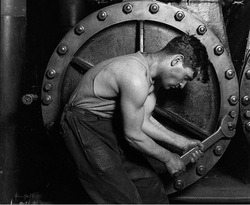Sir William Blackstone identified three types of private economic relationships existing at English Common Law: Guardian/Ward, Husband/Wife and Master/Servant. The Master/Servant relationship functioned for employers as a substitute for slavery, “whereby an absolute and unlimited power is given to the master over the life and fortune of the slave.”
According to Blackstone, there were four kinds of servants, menial servants (domestics), apprentices, laborers, and ministerial servants. But a profound power differential defined all of them: “A Master may by law correct his apprentice or servant for negligence or other misbehavior, so it be done with moderation: though, if the master’s wife beats him, it is good cause of departure. But if any servant, workman, or laborer assaults his master or dame, he shall suffer one year’s imprisonment, and other open corporal punishment, not extending to life or limb.”
Modern American employees are often astonished to learn that the law governing their employment relationship today redeploys the Master/Servant relationship – along with constituent and derivative legal asymmetries. But the history of American employment law can be understood to great degree as the struggle of a master class of employers intent on maintaining irreducible power over its employee-servants.
Modern employers exhaust tremendous resources trying to maintain a status quo in the workplace akin to pre-enlightenment, feudal societies. Employment “at will,” “right to work,” “flexible workforce,” low wages and severely truncated employee rights all derive from a legal doctrine predating notions of individual liberty, equality and human rights. And your boss wants to keep it that way.
No reasonable person would suggest that laws governing the guardianship of minor children should mirror medieval values. Nor would any reasonable person assert the same in relation to marriage. So why should we tolerate such laws in our modern workplaces?
American workers should strongly resist submission to the master/servant relationship by supporting progressive efforts to make laws governing our workplaces consistent with modern values and human rights, whether those efforts come by way of union organization or legislation.
Learn more about workplace matters here.
According to Blackstone, there were four kinds of servants, menial servants (domestics), apprentices, laborers, and ministerial servants. But a profound power differential defined all of them: “A Master may by law correct his apprentice or servant for negligence or other misbehavior, so it be done with moderation: though, if the master’s wife beats him, it is good cause of departure. But if any servant, workman, or laborer assaults his master or dame, he shall suffer one year’s imprisonment, and other open corporal punishment, not extending to life or limb.”
Modern American employees are often astonished to learn that the law governing their employment relationship today redeploys the Master/Servant relationship – along with constituent and derivative legal asymmetries. But the history of American employment law can be understood to great degree as the struggle of a master class of employers intent on maintaining irreducible power over its employee-servants.
Modern employers exhaust tremendous resources trying to maintain a status quo in the workplace akin to pre-enlightenment, feudal societies. Employment “at will,” “right to work,” “flexible workforce,” low wages and severely truncated employee rights all derive from a legal doctrine predating notions of individual liberty, equality and human rights. And your boss wants to keep it that way.
No reasonable person would suggest that laws governing the guardianship of minor children should mirror medieval values. Nor would any reasonable person assert the same in relation to marriage. So why should we tolerate such laws in our modern workplaces?
American workers should strongly resist submission to the master/servant relationship by supporting progressive efforts to make laws governing our workplaces consistent with modern values and human rights, whether those efforts come by way of union organization or legislation.
Learn more about workplace matters here.


 RSS Feed
RSS Feed


